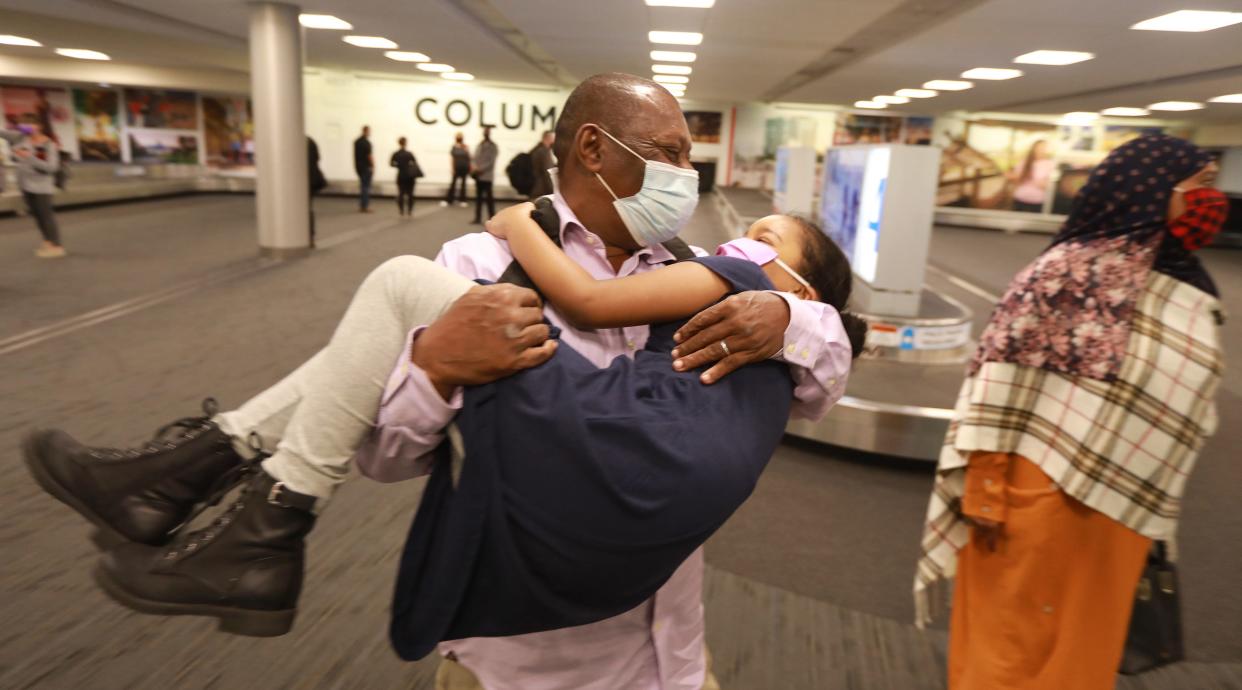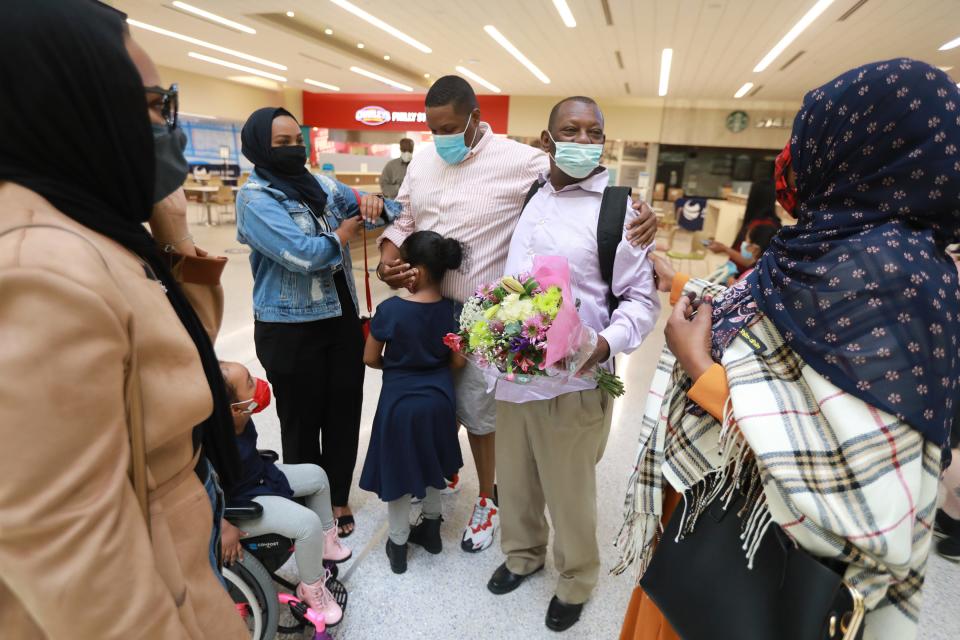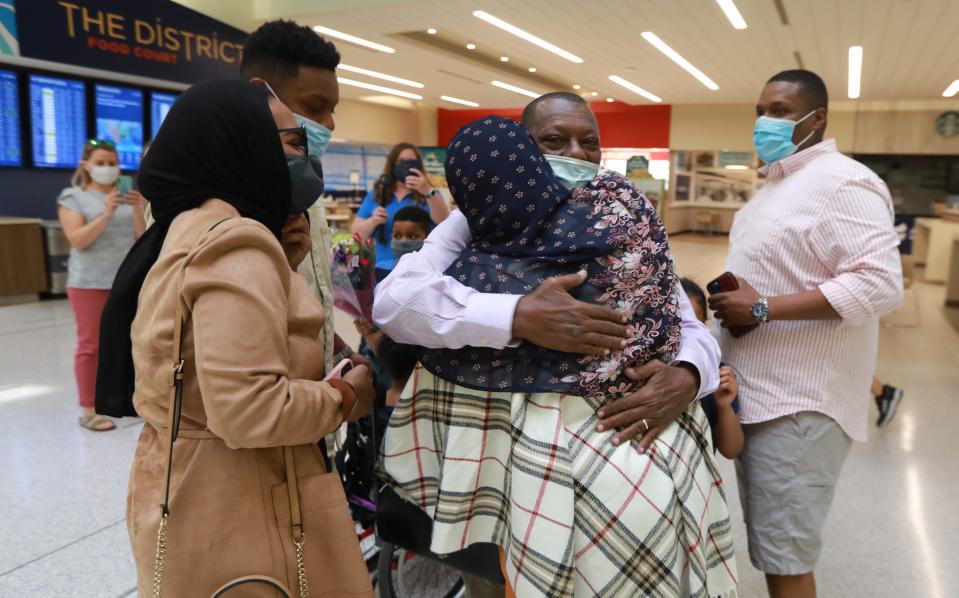Somali father reunites with family in Ohio after years of separation due to 'Muslim ban'

COLUMBUS, Ohio – The first thing Mohamed Salem Ali did when he arrived at John Glenn Columbus International Airport was play a trick on his grandson, Rashed.
The 61-year-old Somali man walked slowly past the 7-year-old, grinning at him from behind his mask and waiting for the boy to notice it was his grandfather strolling past. When the boy did realize who he was, he went to give his grandfather a big hug.
Ali was joining his family in Columbus, Ohio, after 11 years of separation, due in part to the Trump administration’s “Muslim Ban."
At the airport, Ali greeted his daughter, Afnan Salem, 22; his other two grandchildren, Rashed's sisters, Reem, 6, and Rahaf, 5, whom he had never met before; his daughter, Sabah, 24; and his wife, Fadumo Hussein, 49, with hugs and exclamations of “Papa!”
Moments later, he would greet his two eldest, twin brothers Abdelrauuf and Abdulritha, both 29.
The reunion Thursday was a happy one for a family separated for so long, but the same may not be the case for other families like theirs.
Limiting refugee applicants: How Trump immigration policies kept families separated across continents
Years of separation: 'It’s been such a long, exhausting process'
Ali is one of several thousand refugees and immigrants who have waited years to reunite with their families due to Trump administration policies, including banning people from several Muslim-majority and African countries from entering the United States.
Though the Biden Administration lifted Trump's bans on day one, allowing Ali to join his family, the wait for many immigrants seeking to do the same likely isn’t over, experts say. The administration has yet to set a higher cap on the number of refugees admitted each year or to give clear guidance on what is next for those whose visas were denied due to the bans.
Avideh Moussavian, director of federal advocacy at the National Immigration Law Center, said an estimated 74,000 people applied for visas and were directly affected by the bans from January 2017 through the end of January 2021.
Of those, about 41,000 were denied visas and couldn’t get an exception or a waiver.
Ali is here because his immigrant visa — which he applied for in January 2017 through one of his sons who now a citizen — was never outright denied, and was recently approved, said Angie Plummer, executive director of Community Refugee and Immigration Services (CRIS), one of two refugee resettlement agencies in Columbus.
“It’s been such a long, exhausting process,” said Afnan, who is set to graduate from Ohio State University in August. She said she is so glad her father will get to see her walk across the stage, especially after he missed her high school graduation and so many other family celebrations.
“He was actually supposed to be here four years ago, but he was stopped because of the travel ban," she said.
In-depth: Comparing the COVID-19 vaccines
A happy surprise: 'We waited for this moment for so long'
Ali’s visa being approved and his flight being scheduled so soon was a surprise for the whole family, Afnan said. It was a relief for them, too, especially after being separated for so long.
"My biggest fear was one of us passes away before we're reunited," said Ali's wife, Hussein, who visited her husband in 2019 with Afnan and Rashed. "I'm so grateful to God he finally reunited with our family."
Hussein gave her husband a hug when he got off the plane and then lovingly adjusted his face mask before rubbing his arm as he talked to his grandchildren.
"The best thing in the world is having your family under one roof," she said.
She was excited to show her husband their home in Ohio, and watched happily as he lifted his grandchildren for hugs and posed for photos with them at baggage claim.
"We waited for this moment for so long," Afnan said.

The family has remained close through the years, despite their distance, Afnan said. They talked every day over the phone or Facetime, even Ali's grandchildren, his son Abdelrauuf's children.
"They were very excited to see him in real life," Abdelrauuf said of his children, one of whom was holding her grandfather's hand as they all left the airport.
Afnan remembers when she and Rashed left her father in Kuala Lumpur, Malaysia, where he was living, to return to Columbus after their trip to see him in 2019.
Rashed asked her, "'Why can't grandpa go with us?'" she said, and she replied that he's not allowed to come yet because of a ban by the United States government.
"He said, 'but grandpa is a good guy. Can I just tell them that?'" Afnan said.
"I know the immigration process takes forever, but every family deserves to be together," Afnan said. "I feel like I was being told I didn't deserve to be with my dad because he's Somali."
'A really huge message'
The Trump administration issued multiple bans on people from certain nations, many of them majority-Muslim, including Somalia, often criticized as “Muslim Bans.”
During Biden’s campaign, the candidate promised to roll back the bans and increase the number of refugees resettled in the country.
He rescinded the ban on his first day in office, Jan. 20, but hasn’t increased the number of refugees from the historic low of 15,000.
“To have that commitment fulfilled as a day one promise in issuing that proclamation that rescinded the bans was a really huge message,” Moussavian said.
She also praised the president’s language in his proclamation ending the bans.
“Those actions are a stain on our national conscience and are inconsistent with our long history of welcoming people of all faiths and no faith at all,” Biden’s proclamation reads.

There is still more to be done, Moussavian said.
Some people who were denied visas due to the bans will now have to reapply, and she said that's an unfair burden for people who have been discriminated against.
“We obviously understood it would take more than one day to fully address the impact," Moussavian said. "At the same time we absolutely want to ensure this administration does more to recognize this commitment."
Eager for change
Moussavian and other immigration advocates are urging the Biden administration to increase the number of refugees allowed to be resettled in the country; ensure people are made aware the bans have been lifted; and reach out to people to reapply for a visa.
"The last administration really wanted to send a very clear message of, 'Don't come here, you're not welcome here,' and they did that in so many different ways," Moussavian said. "So that means this administration really has to be committed beyond just words on paper."
Immigration advocates are also pushing for passage of the National Origin-Based Antidiscrimination for Nonimmigrants (NO BAN) Act in Congress. It is a bill that would ensure that it is more difficult for presidents to put bans in place that discriminate against people entering the country.
Plummer said many refugees are still unsure about when they will be reunited with their family members.
"People really had an expectation, a bit too high, that Biden is sworn in and suddenly families are going to start coming," Plummer said.
Moussavian said nationally, it's hard to track cases affected by rolling back the bans, but that she hasn't heard of many people coming here.
"Time is ticking and people are waiting," Plummer said. "We struggled for four years and really saw this light at the end of the that dark tunnel. It feels like the light's dimming a little bit."
Follow reporter Danae King on Twitter: @DanaeKing
What you should know: The FDA and CDC recommend pausing the use of Johnson & Johnson's COVID vaccine
This article originally appeared on The Columbus Dispatch: Reunited: End of 'Muslim ban' means Somali man is back with family

 Yahoo Movies
Yahoo Movies 
